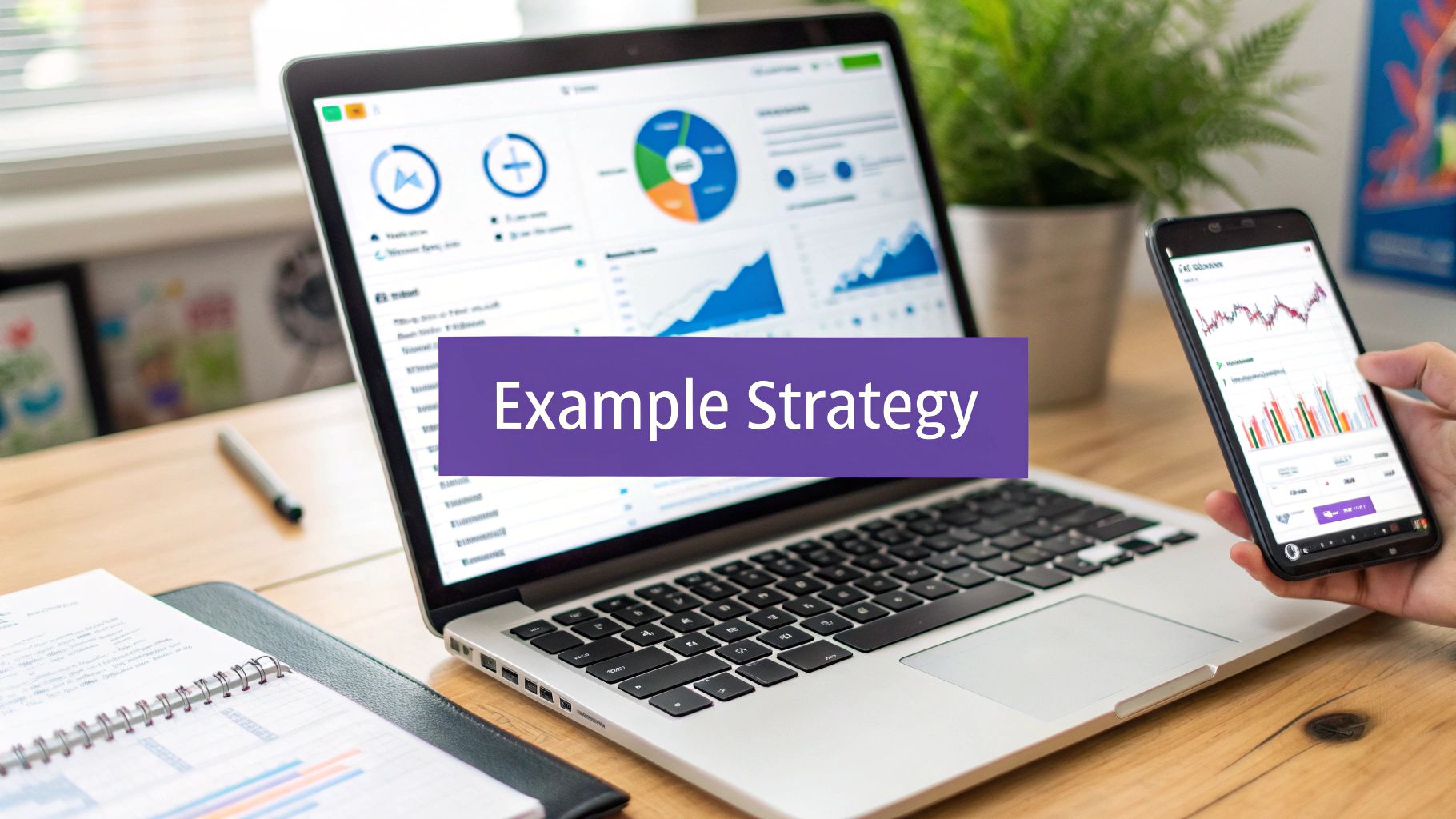12 Best Online Reputation Management Tools for 2025

In today's hyper-connected marketplace, your digital footprint is your resume, storefront, and first impression all rolled into one. What is said about you or your business online can directly impact your success, as a single negative review, a misleading search result, or a viral social media comment can undo years of hard work. Conversely, a powerful and positive online reputation acts as a significant asset, attracting new customers, top talent, and valuable business opportunities.
Actively managing this digital narrative requires more than just passive monitoring; it demands constant vigilance, strategic engagement, and the right technology stack. This is where dedicated software becomes essential. Finding the right solution can be overwhelming, with countless platforms promising comprehensive oversight. This guide cuts through the noise to provide a practical, in-depth analysis of the best online reputation management tools available today.
We move beyond generic feature lists to explore real-world applications, honest limitations, and critical implementation advice for each platform. Our goal is to help you select the perfect tool to protect, manage, and enhance your brand's digital presence. To fully grasp the scope of these solutions, it's essential to first understand the importance of online reputation for any modern business or professional. In the sections that follow, you will find detailed profiles with screenshots and direct links, enabling you to make a well-informed decision for your specific needs, whether you're a startup founder, a marketing agency, or a freelancer building a personal brand.
1. MakerBox: Best for AI-Powered Personal Branding
MakerBox distinguishes itself in the online reputation management landscape by focusing intently on the individual professional rather than the corporate entity. It operates less like a traditional monitoring service and more like a proactive, AI-powered co-pilot for building a formidable personal brand. This platform is engineered for consultants, executives, and entrepreneurs who understand that in today's digital world, their personal reputation is a direct driver of opportunities. Instead of passively tracking mentions, MakerBox empowers you to actively shape your public narrative across crucial platforms like LinkedIn and X (formerly Twitter).
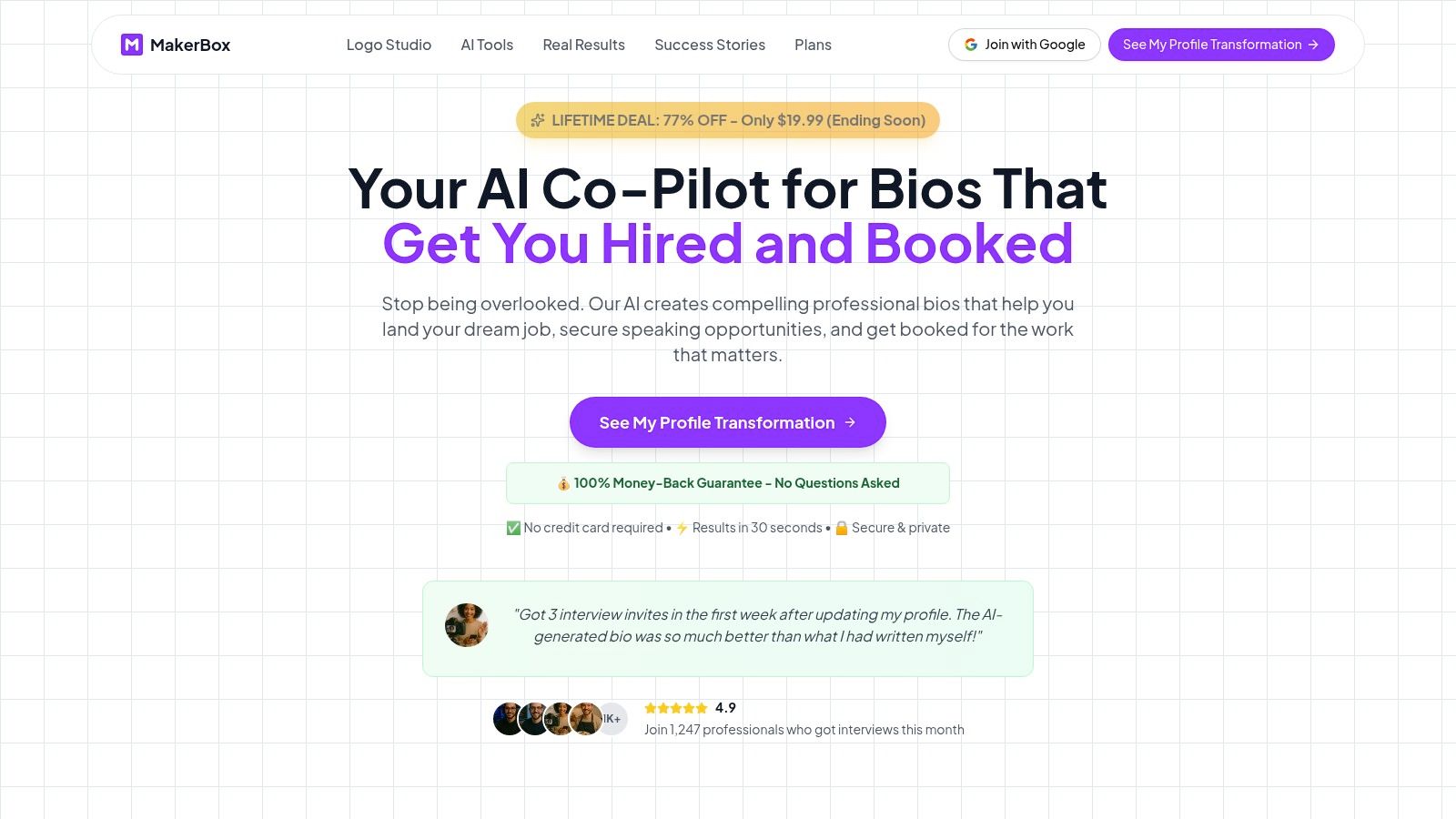
The platform’s core strength lies in its specialized AI, trained on thousands of high-performing profiles. It generates compelling bios and content suggestions designed to project authority, attract connection requests, and solve the persistent "what should I post?" dilemma. For those looking to fully understand the strategies behind these AI-driven tactics, exploring the core concepts of personal branding and social automation can provide a powerful strategic framework.
In-Depth Feature Analysis
MakerBox’s toolset is precision-engineered for personal brand elevation:
- AI Profile Optimization: The AI goes beyond generic advice, providing data-driven recommendations to craft LinkedIn and X bios that resonate with your target audience and algorithms.
- AI Portrait Magic: A standout feature that solves a common branding hurdle. Users can upload a simple selfie and receive a suite of professional-grade headshots, eliminating the cost and time of a photoshoot.
- Content Engine & Scheduler: It provides a library of content ideas and allows you to schedule posts, ensuring a consistent and authoritative online presence. Integrated analytics track performance to refine your strategy.
Ideal Use Cases & Limitations
MakerBox excels for freelancers seeking to attract higher-paying clients, executives aiming to establish themselves as industry thought leaders, and agencies managing personal brands for multiple clients via its dedicated workspaces.
However, its focus is a double-edged sword. This is not the tool for managing Yelp reviews or monitoring corporate brand sentiment across the web. Its power is concentrated on the individual. Furthermore, to unlock its full, unlimited potential, users must connect their own OpenAI or Anthropic API key, a model that, while highly cost-effective for power users, represents an extra technical step.
Pros & Cons
| Pros | Cons |
|---|---|
| Drastically improves profile engagement and inbound opportunities | Not designed for monitoring business review sites (Yelp, G2, etc.) |
| Highly cost-effective Lifetime Deal offers exceptional long-term value | Requires bringing your own API key for unlimited generation |
| Solves content creation challenges with an AI-powered content engine | Primarily focused on individuals, not corporate brands |
| Agency-friendly workspaces for managing multiple client profiles |
Website: https://www.makerbox.io
2. Birdeye
Birdeye positions itself as a comprehensive, end-to-end experience platform, making it one of the best online reputation management tools for multi-location businesses that need to consolidate customer interactions. It excels at aggregating reviews, social media mentions, and messages into a unified inbox, allowing teams to manage feedback efficiently across hundreds or even thousands of storefronts. Its primary differentiator is its deep focus on workflow automation, tailored specifically for the complexities of franchise and enterprise-level operations.
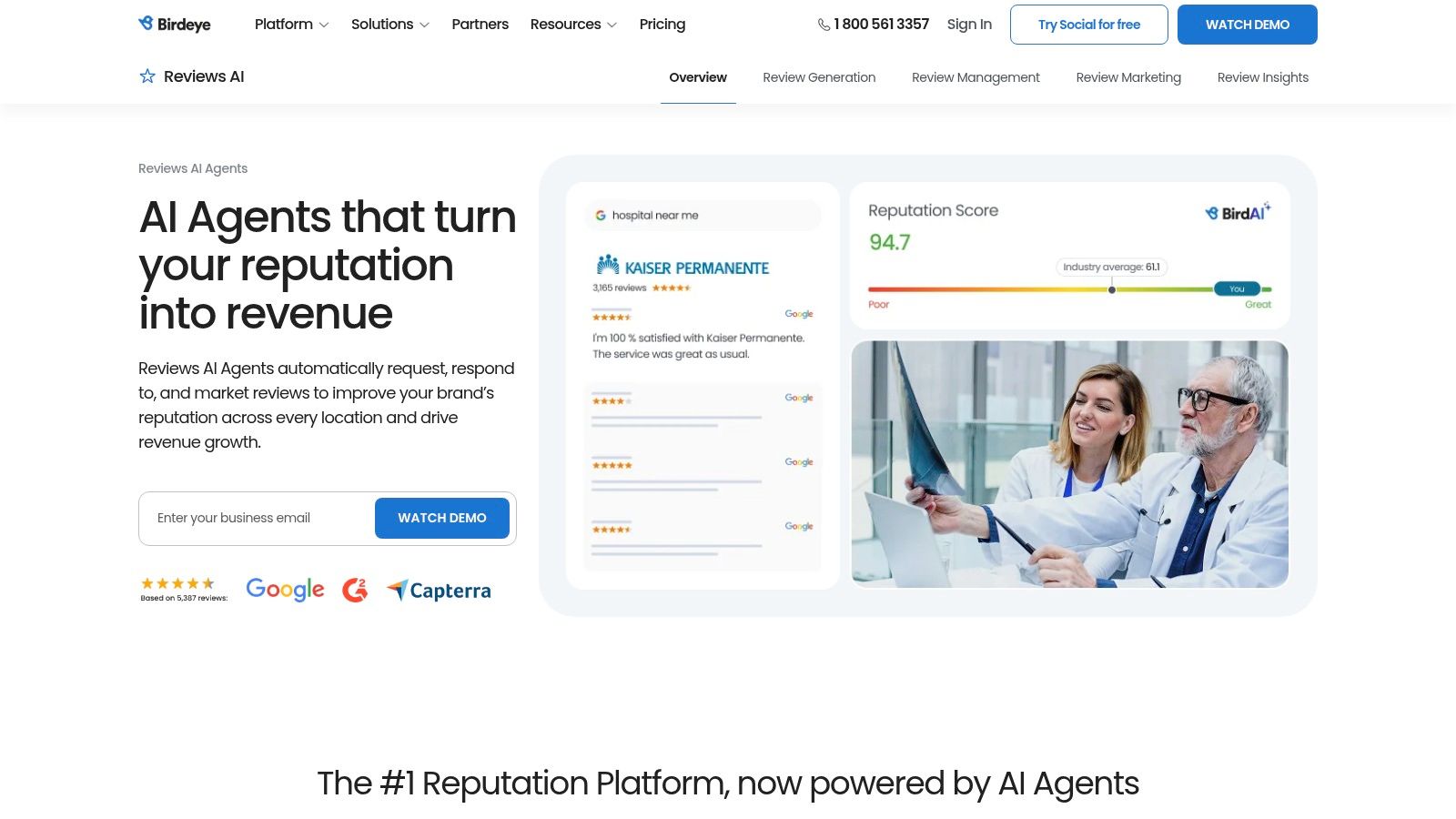
The platform leverages AI agents to optimize review request timing and can auto-respond to reviews based on sentiment analysis, which saves significant time for marketing teams. This automation extends to amplifying positive feedback by pushing 5-star reviews to social media channels and ad campaigns, directly impacting brand perception and SEO. The dashboard provides granular reporting on everything from review volume and sentiment trends to individual location performance and response times.
Key Features & Considerations
- AI-Powered Automation: Utilizes AI for smart review requests and automated, sentiment-aware responses.
- Centralized Management: Manages reviews from over 200 sites, listings, and messages in a single dashboard.
- Marketing Amplification: Features tools to publish positive reviews directly to social media and ad extensions.
- Deep Analytics: Offers robust reporting on review volume, ratings, NPS, and response time metrics across locations.
Pros & Cons
| Pros | Cons |
|---|---|
| Excellent multi-location support and workflows | Pricing is custom and not publicly available |
| Broad coverage of 200+ review sites | Some smaller businesses report complex contracts |
| Strong marketing and SEO integration tools | Can be overly feature-rich for single-location users |
Birdeye's custom pricing model means you'll need to contact their sales team for a quote, as costs vary based on locations and features. While it is an incredibly powerful tool for large-scale operations, small businesses might find the platform's complexity and contract terms more restrictive than other solutions.
Website: https://birdeye.com/reviews/
3. Podium
Podium establishes itself as a powerful AI-driven interaction platform specifically designed for local businesses and franchises. Its core strength lies in leveraging SMS for customer engagement, making it one of the best online reputation management tools for companies that rely on direct, text-based communication. The platform consolidates customer interactions from SMS, web chat, and social media DMs into a single, unified inbox, streamlining communication and ensuring no message is missed. Its primary differentiator is its emphasis on text-based review generation, which typically sees higher open and response rates than email.
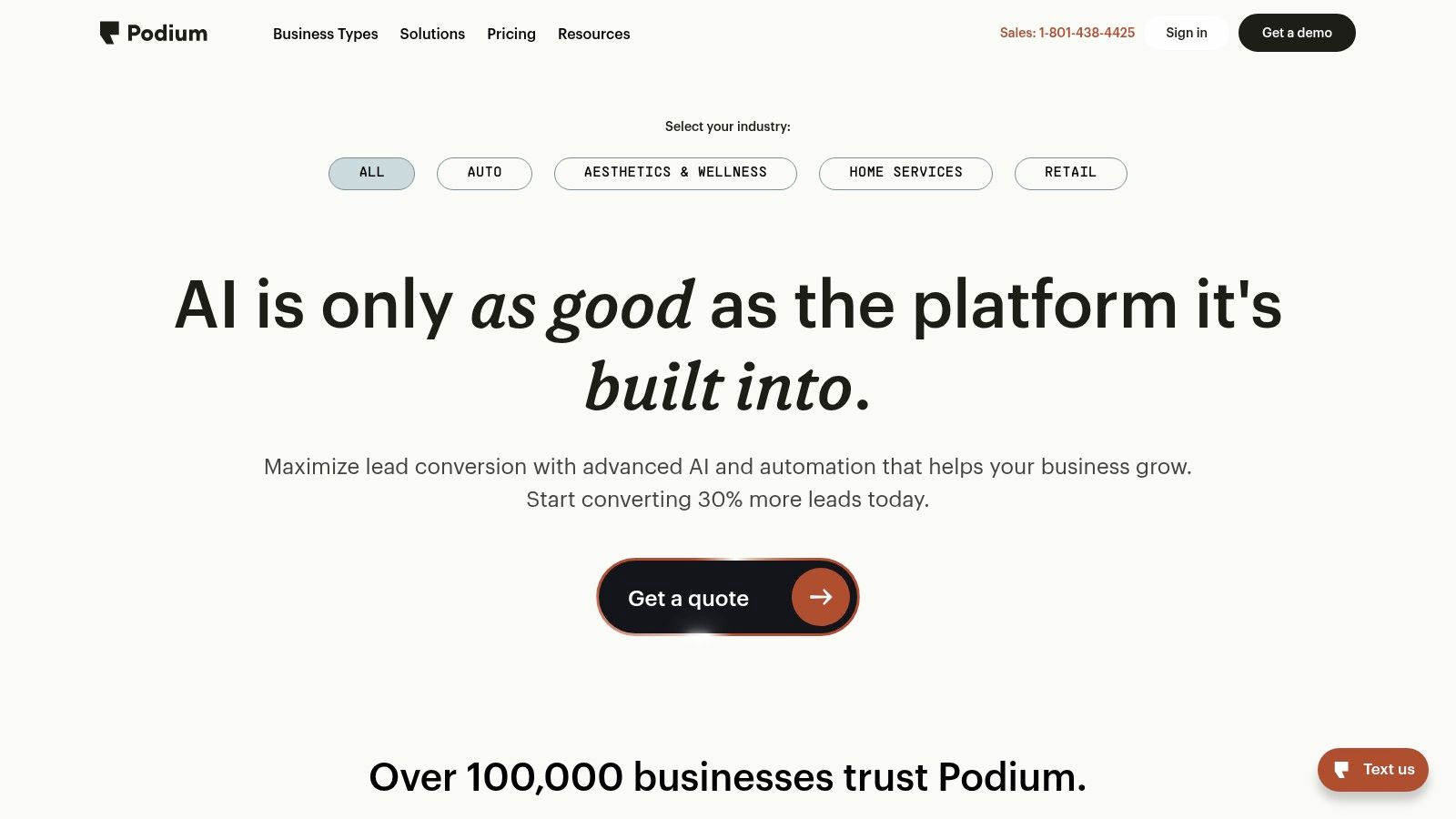
The platform is built to convert website visitors into text conversations and then into reviews or even sales. Add-on features like Podium Payments and Podium Phones allow businesses to manage nearly the entire customer lifecycle within one system, from initial contact to payment collection and follow-up. This focus on turning conversations into revenue is a key benefit for local service providers, retailers, and healthcare practices looking to modernize their customer experience and simplify their tech stack.
Key Features & Considerations
- Text-Based Review Invites: Specializes in sending review requests via SMS, which often yields higher conversion rates.
- Central Inbox: Manages communications from SMS, web chat, Google Business Messages, and social DMs in one place.
- Add-On Capabilities: Offers integrated phone and payment processing services for a more holistic customer management system.
- Dedicated Support: Provides industry-specific onboarding and dedicated customer success resources to help users maximize the platform.
Pros & Cons
| Pros | Cons |
|---|---|
| Excellent SMS-based review collection workflow | Pricing is not publicly listed and requires a quote |
| Widely adopted and trusted by local businesses | Contracts can vary; some users report strict auto-renew policies |
| Strong customer success and onboarding resources | Cancellation windows can be tight and difficult to navigate |
Podium's pricing is customized based on your business needs and selected features, so you will need to contact their sales team for a quote. While its SMS-first approach is highly effective for local businesses, prospective users should carefully review their contract terms, particularly regarding auto-renewal and cancellation policies, to ensure they align with their business plans.
Website: https://www.podium.com/getpricing
4. Reputation
Reputation positions itself as an all-in-one Reputation Experience Management (RXM) platform, making it one of the best online reputation management tools for large, enterprise-level organizations. It is particularly strong in regulated industries like healthcare and automotive. The platform excels at integrating reviews, surveys, social media listening, and business listings into a cohesive system, all centered around its proprietary "Reputation Score," a benchmark for brand health. Its primary differentiator is its scale and its comprehensive, integrated suite of modules that go beyond just reviews.
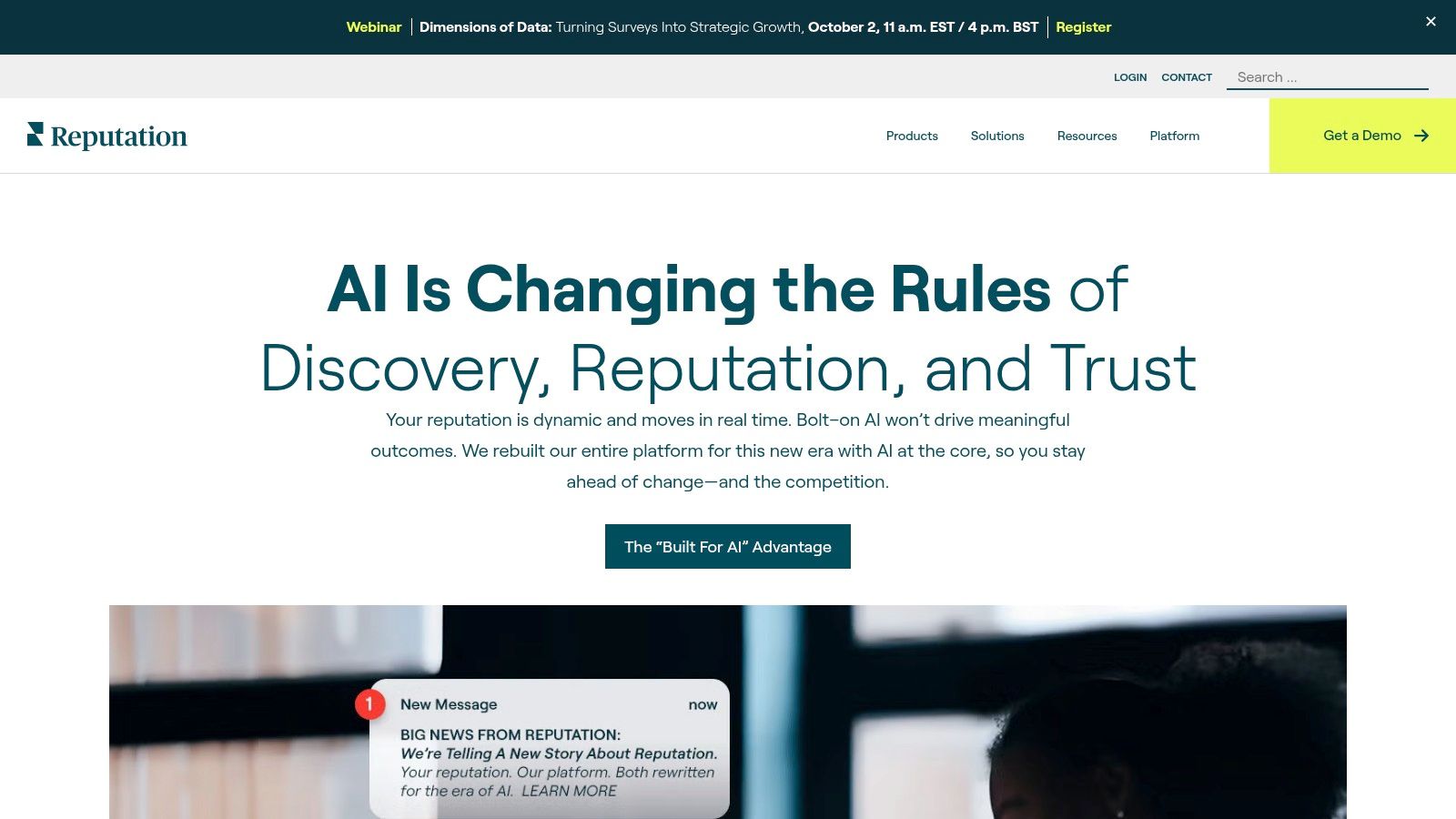
The platform uses AI-assisted responses to help teams manage high volumes of feedback efficiently, providing suggested replies and sentiment analysis. Its taxonomy-driven insights engine can categorize feedback into operational areas like "staff friendliness" or "store cleanliness," providing actionable data for business improvement. This deep integration allows businesses to connect customer feedback from a survey directly to a negative review or a social media complaint, creating a holistic view of the customer journey and highlighting the importance of social media reputation management.
Key Features & Considerations
- Reputation Score: A proprietary, real-time score that benchmarks brand performance against competitors.
- Integrated Modules: Combines reviews, listings, surveys, social media, and business intelligence in one platform.
- AI-Assisted Insights: Uses AI and natural language processing to categorize feedback and suggest responses.
- Enterprise-Grade Analytics: Highly customizable dashboards and reporting designed for complex, multi-location hierarchies.
Pros & Cons
| Pros | Cons |
|---|---|
| Comprehensive, all-in-one platform | Enterprise-level pricing requires sales negotiation |
| Built for scale with thousands of locations | Some users report an aging UI and slower innovation |
| Recognized leader in analyst reports (e.g., Forrester) | Can be overly complex for smaller organizations |
Reputation's pricing is entirely custom and geared toward enterprise clients, so you must engage with their sales team for a quote. While it is a powerhouse for large-scale operations needing a single source of truth for customer experience data, some users recommend requesting a thorough demo to ensure the interface meets your team's needs, as it can feel less modern than newer competitors.
Website: https://www.reputation.com/
5. Yext Reviews
Yext Reviews is a powerful reputation and listings management platform designed for multi-location brands that require tight integration between their local SEO efforts and review management. Its unique value proposition lies in combining review monitoring, response, and analytics with Yext’s core suite of Listings, Pages, and Search products. This holistic approach ensures that a brand’s online presence, from business information accuracy to customer feedback, is managed cohesively from a single source of truth, making it one of the best online reputation management tools for enterprise-level organizations.
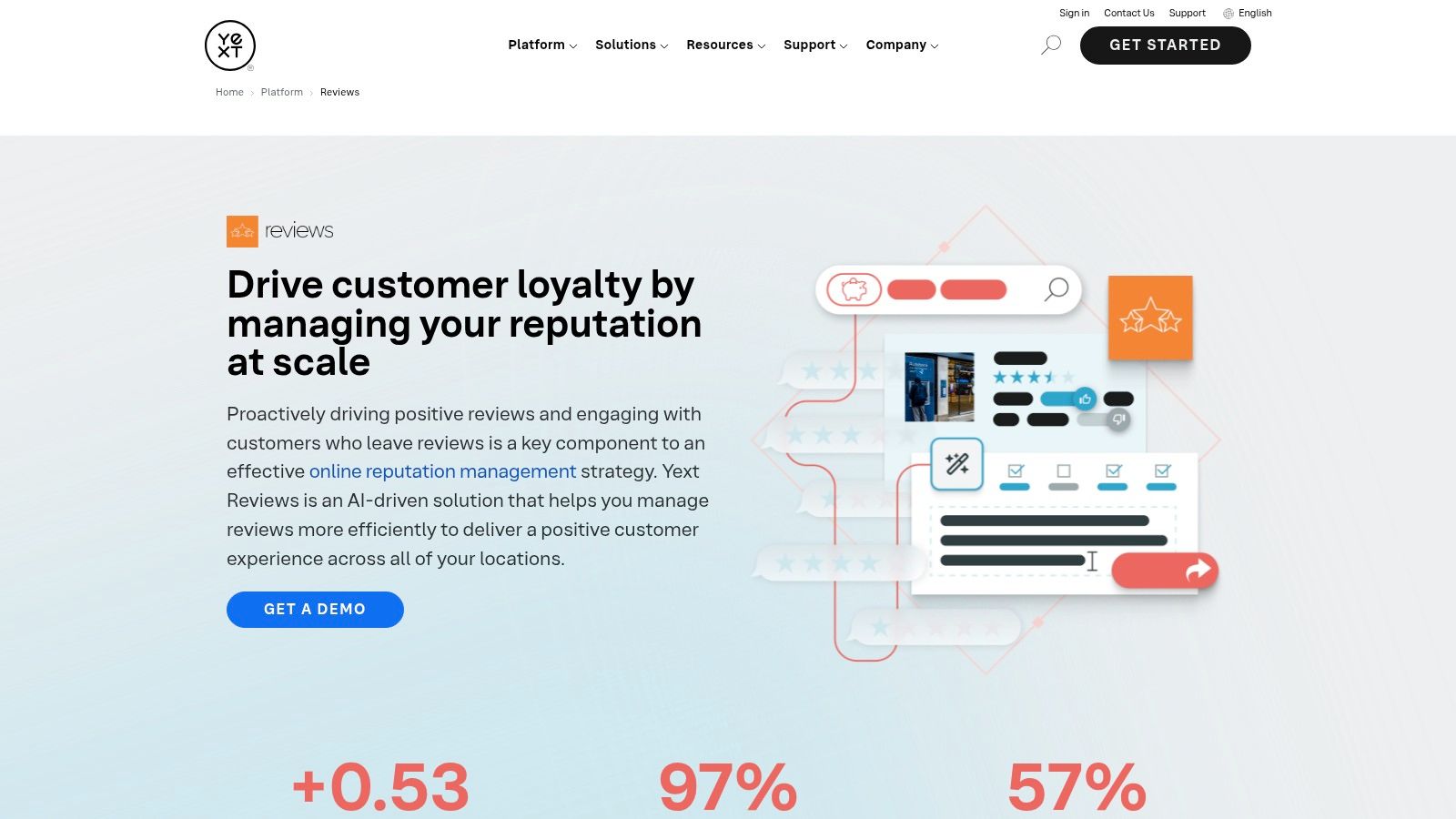
The platform enables businesses to monitor and respond to reviews across major sites directly from location-specific dashboards, supported by real-time alerts that help teams maintain prompt response times. By connecting review data directly to listings accuracy, Yext helps brands understand how reputation impacts local search performance. This synergy is crucial for businesses looking to increase their online presence and drive foot traffic, as it directly ties customer sentiment to visibility in search results and on maps.
Key Features & Considerations
- Seamless Platform Integration: Combines review management with Yext Listings, Pages, and Search for a unified brand presence.
- Location-Level Management: Provides granular dashboards, permissions, and real-time alerts tailored for multi-location enterprises.
- Review Trend Analytics: Delivers insights into customer sentiment, keyword trends, and performance metrics across all locations.
- Workflow Automation: Features tools to assign reviews, set response goals, and manage team workflows efficiently.
Pros & Cons
| Pros | Cons |
|---|---|
| Strong connection between listings accuracy and reputation | Pricing is not publicly listed and can be expensive |
| Enterprise-grade permissions and workflow controls | Some third-party reviews note cost sensitivity per location |
| Robust ecosystem with extensive integrations | ROI may need careful validation for smaller businesses |
Yext operates on a custom pricing model, requiring direct contact for a quote tailored to your business's scale and needs. While its integrated approach is a significant advantage for large, complex organizations, the associated costs may be a key consideration for smaller companies or those who don't need the full suite of Yext products.
Website: https://www.yext.com/platform/reviews
6. ReviewTrackers (by InMoment)
ReviewTrackers, now part of InMoment, carves out its niche by focusing purely on the essentials of review monitoring and management. It stands as one of the best online reputation management tools for businesses that prioritize operational excellence in feedback response over an all-encompassing marketing suite. The platform offers a streamlined, centralized inbox that aggregates reviews from dozens of sites with real-time alerts, ensuring that no customer feedback goes unnoticed. Its core strength lies in its simplicity and direct approach to review operations, making it highly effective for teams dedicated to customer experience.
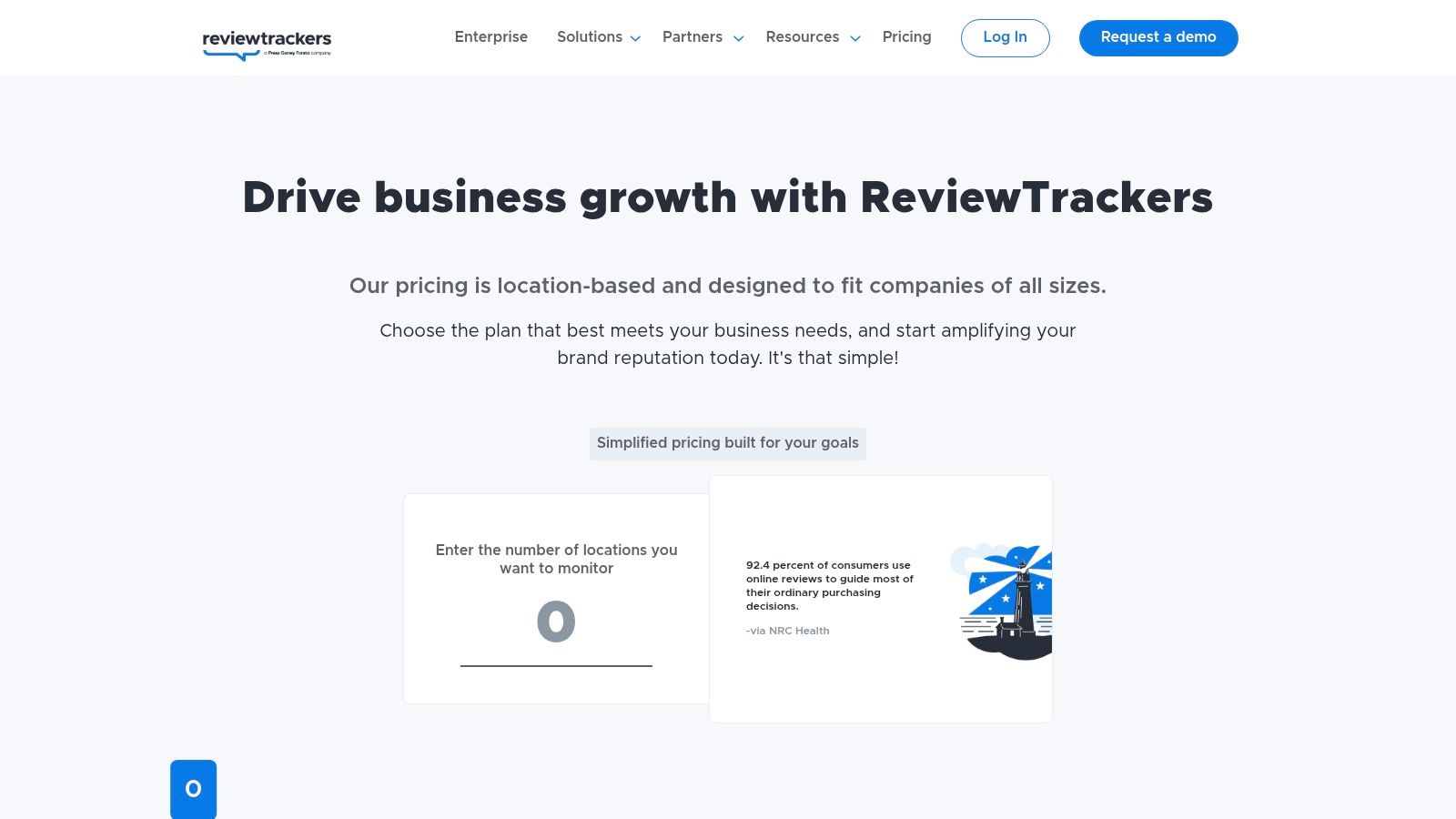
The platform includes robust features like review request automation and customizable response templates to improve team efficiency. It also provides valuable local SEO tools, such as listings management and local rank tracking, to help businesses understand their visibility at a granular level. For organizations with specific needs, ReviewTrackers offers optional add-on modules for employer reviews (like Glassdoor) and app-store reviews, showcasing its flexibility. This focused, modular approach allows businesses to build a solution that fits their exact needs without paying for extraneous features.
Key Features & Considerations
- Centralized Review Inbox: Consolidates reviews from numerous sources with real-time alerts for prompt responses.
- Request Automation: Features tools to systematically request new reviews from customers via email or SMS.
- Local SEO Tools: Includes listings management and local keyword rank tracking to monitor search performance.
- Modular Add-Ons: Offers optional services to track employer and app-store reviews for specialized needs.
Pros & Cons
| Pros | Cons |
|---|---|
| Clear and focused on core review operations | Pricing is not published and requires a sales call |
| Flexible location-based pricing packages | Less feature-rich than broad "everything-suite" platforms |
| Optional services cover niche review categories | Lacks advanced social media and marketing tools |
ReviewTrackers uses a custom pricing model based on the number of locations, so you will need to contact their sales team for a quote. Its focused approach makes it an excellent choice for businesses that need to master review management efficiently but might be less ideal for those seeking a single platform for all marketing, social, and reputation tasks.
Website: https://www.reviewtrackers.com/plans/
7. Sprout Social
Sprout Social is primarily a social media management platform that earns its place among the best online reputation management tools by integrating review management directly into its social workflows. It excels for teams that view reputation as an extension of their social media strategy, offering a unified "Smart Inbox" where reviews from sites like Google My Business and Facebook appear alongside social DMs and mentions. This consolidation allows marketers to handle all public-facing communication from one place, ensuring brand voice consistency and rapid response times.
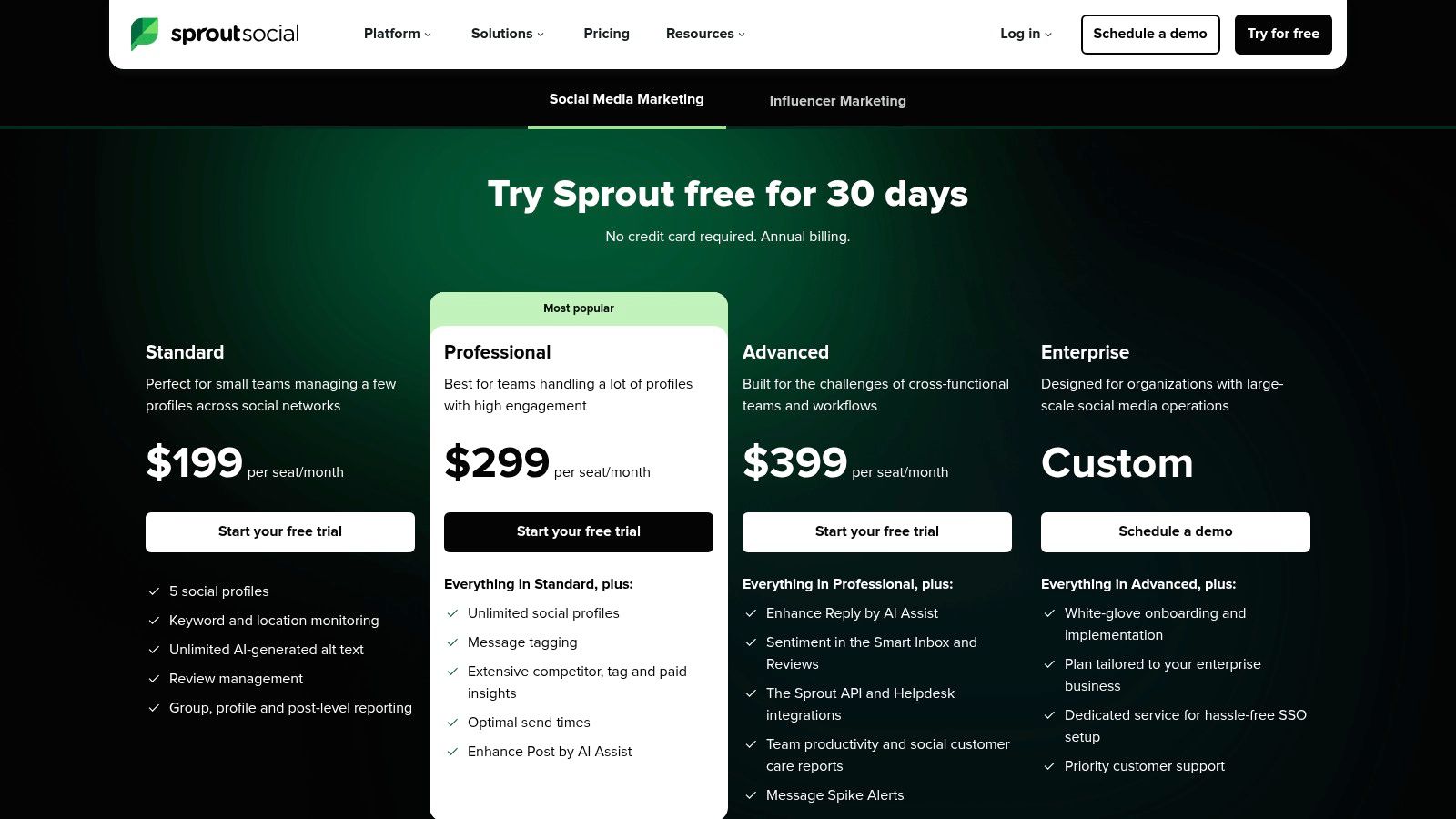
The platform’s strength lies in its powerful publishing, scheduling, and analytics capabilities, which provide a holistic view of brand health across multiple channels. While its review features are less extensive than dedicated reputation platforms, it offers sophisticated social listening and sentiment analysis in its higher-tier plans. This enables teams to proactively track brand conversations and competitive insights beyond direct reviews. For businesses that are already heavily invested in social media, Sprout Social provides an elegant way to fold reputation management into their existing processes and toolset, which can be further enhanced with AI-powered features. Learn more about the best AI tools for social media to augment this workflow.
Key Features & Considerations
- Unified Smart Inbox: Consolidates reviews, social media mentions, and messages into a single stream for efficient management.
- Advanced Social Listening: Offers tools to monitor keywords, hashtags, and brand sentiment across the social web (in advanced plans).
- Robust Publishing Tools: Comprehensive content calendar, scheduling, and approval workflows for social media.
- Detailed Analytics: Provides in-depth reports on social engagement, team performance, and audience growth.
Pros & Cons
| Pros | Cons |
|---|---|
| Combines social media and reviews management | Core reputation features are less robust than specialized tools |
| Strong analytics and a user-friendly interface | Pricing per user is relatively high |
| Scalable from small teams to large enterprises | Best value is on annual billing commitments |
Sprout Social's pricing is transparent, starting with a per-user, per-month model, and they offer a 30-day free trial to test the platform. It's an ideal solution for marketing teams who want to manage social and review channels cohesively without needing a separate, dedicated reputation tool.
Website: https://sproutsocial.com/pricing/
8. Brand24
Brand24 carves out its niche as one of the best online reputation management tools by focusing on real-time social and web listening. Instead of concentrating on traditional review sites, it scours social media networks, news sites, blogs, forums, and even video platforms for mentions of your brand, keywords, or competitors. This makes it an ideal solution for businesses whose reputation is primarily shaped by public conversation and media coverage rather than formal customer reviews.
The platform’s strength lies in its speed and accessibility. It provides instant alerts via email or Slack the moment a mention is detected, allowing marketing and PR teams to react quickly to both positive and negative sentiment. Its AI-driven sentiment analysis helps categorize conversations at scale, offering a quick overview of public perception. This data is invaluable for understanding the impact of marketing campaigns, tracking influencer reach, and implementing a strong social media branding guide.
Key Features & Considerations
- Real-Time Media Monitoring: Tracks mentions across social media, news, blogs, forums, and video in real-time.
- AI-Powered Sentiment Analysis: Automatically categorizes mentions as positive, negative, or neutral to gauge public opinion.
- Instant Alerts & Reporting: Delivers customizable alerts via email and Slack, with options for data exports and PDF reports.
- Influence Scoring: Identifies the most influential authors or profiles talking about your brand to prioritize engagement.
Pros & Cons
| Pros | Cons |
|---|---|
| Transparent tiered pricing and a free trial | Focuses on listening, lacks native first-party review generation |
| Fast setup and efficient real-time alerting system | Plan limits on mentions and keywords require volume estimation |
| Unlimited users included on higher-tier plans | Does not manage business listings on platforms like Google Maps |
Brand24 offers transparent, tiered pricing plans starting from an individual level up to enterprise solutions, making it accessible for various budgets. However, businesses must carefully estimate their mention volume, as each plan has keyword and mention limits. It's a powerful tool for monitoring public discourse but should be paired with another platform if managing direct customer reviews is a priority.
Website: https://brand24.com/prices/
9. Mention
Mention carves out its niche as a company-grade media monitoring and social listening platform, making it one of the best online reputation management tools for brands focused on tracking brand perception over direct engagement. It excels at scouring the web, social media, and over 75 review sites to capture real-time conversations about your brand, competitors, or industry. Its primary differentiator is the depth of its monitoring capabilities, using advanced Boolean queries to pinpoint specific discussions and analyze sentiment at scale.
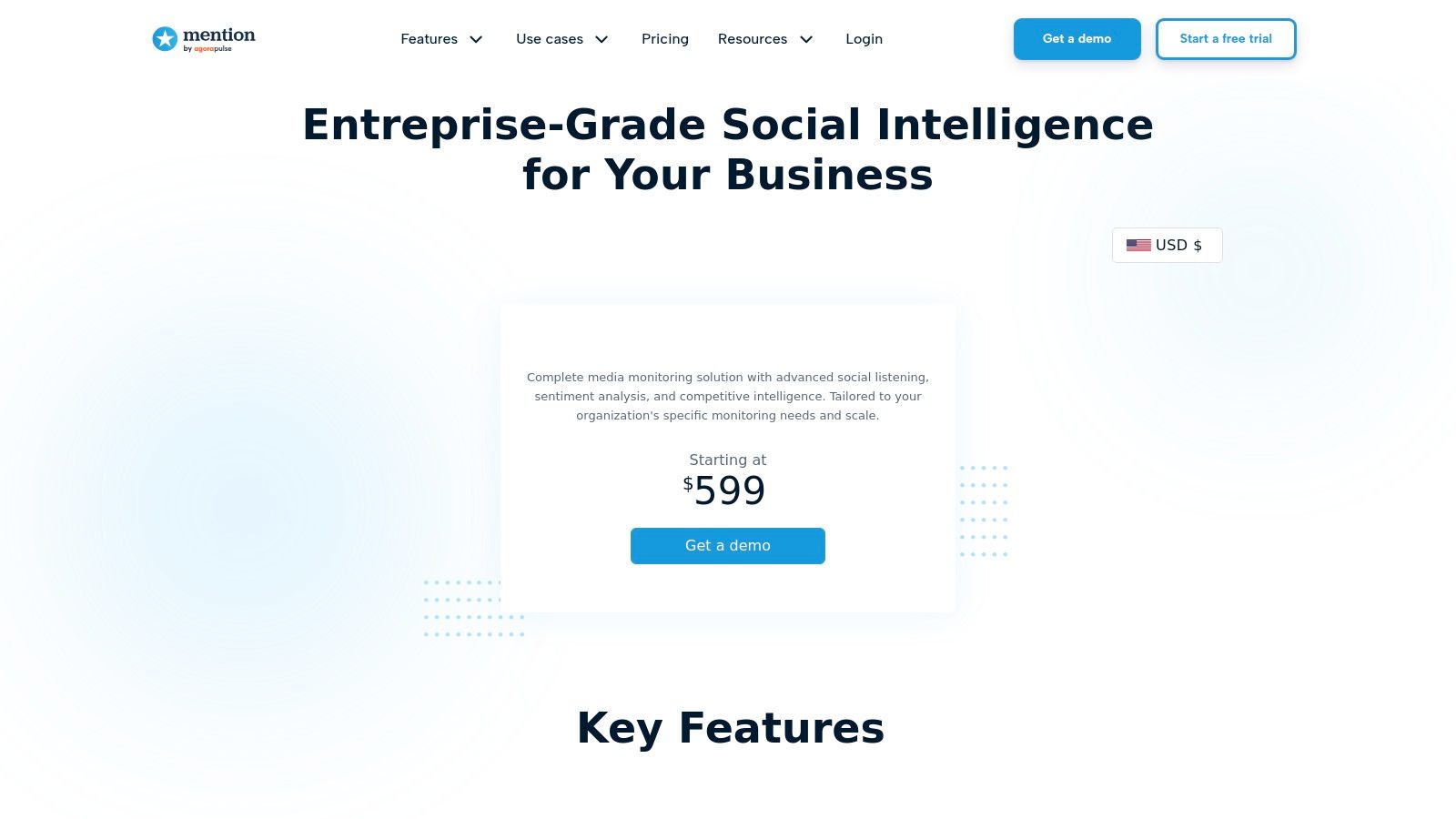
The platform is built for insight generation rather than direct response. Users can create highly customizable dashboards to track Share of Voice, sentiment trends, and key influencers, providing a clear picture of market positioning. While it has deprecated direct posting and responding features, its powerful API allows it to integrate seamlessly with social media management tools, creating a specialized stack where Mention handles the listening and another tool handles the engagement. This focus makes it ideal for marketing and PR teams who need robust data for strategic planning.
Key Features & Considerations
- Real-Time Tracking: Utilizes advanced Boolean queries for precise, real-time monitoring across the web and social media.
- Sentiment Analysis: Automatically analyzes the sentiment of mentions to help you quickly gauge public perception.
- Share of Voice Metrics: Provides clear competitive intelligence by comparing your brand's mention volume against rivals.
- Customizable Dashboards: Features collaborative, customizable reports and dashboards for team-based analysis and insight sharing.
Pros & Cons
| Pros | Cons |
|---|---|
| Excellent enterprise-grade reporting and insights | Premium-priced, with Company plan starting at $599/mo |
| Broad source coverage including major review sites | Lacks native review response or social posting features |
| Strong team collaboration and alert capabilities | Better for monitoring than for active engagement |
Mention's pricing reflects its enterprise focus, with the comprehensive "Company" plan starting at $599 per month. While this is a significant investment, the quality of its monitoring data and competitive insights is invaluable for large brands. It's less suited for businesses that need an all-in-one engagement tool and is best paired with a dedicated social media management platform.
Website: https://mention.com/en/pricing/
10. Trustpilot Business
Trustpilot Business is less of a traditional management tool and more of a dedicated consumer review ecosystem. It stands out by providing businesses with a platform to proactively collect and showcase customer feedback on one of the world's most recognized review sites. Its strength lies in leveraging its brand authority to build social proof, making it one of the best online reputation management tools for e-commerce and B2C companies focused on building consumer trust and boosting conversion rates.
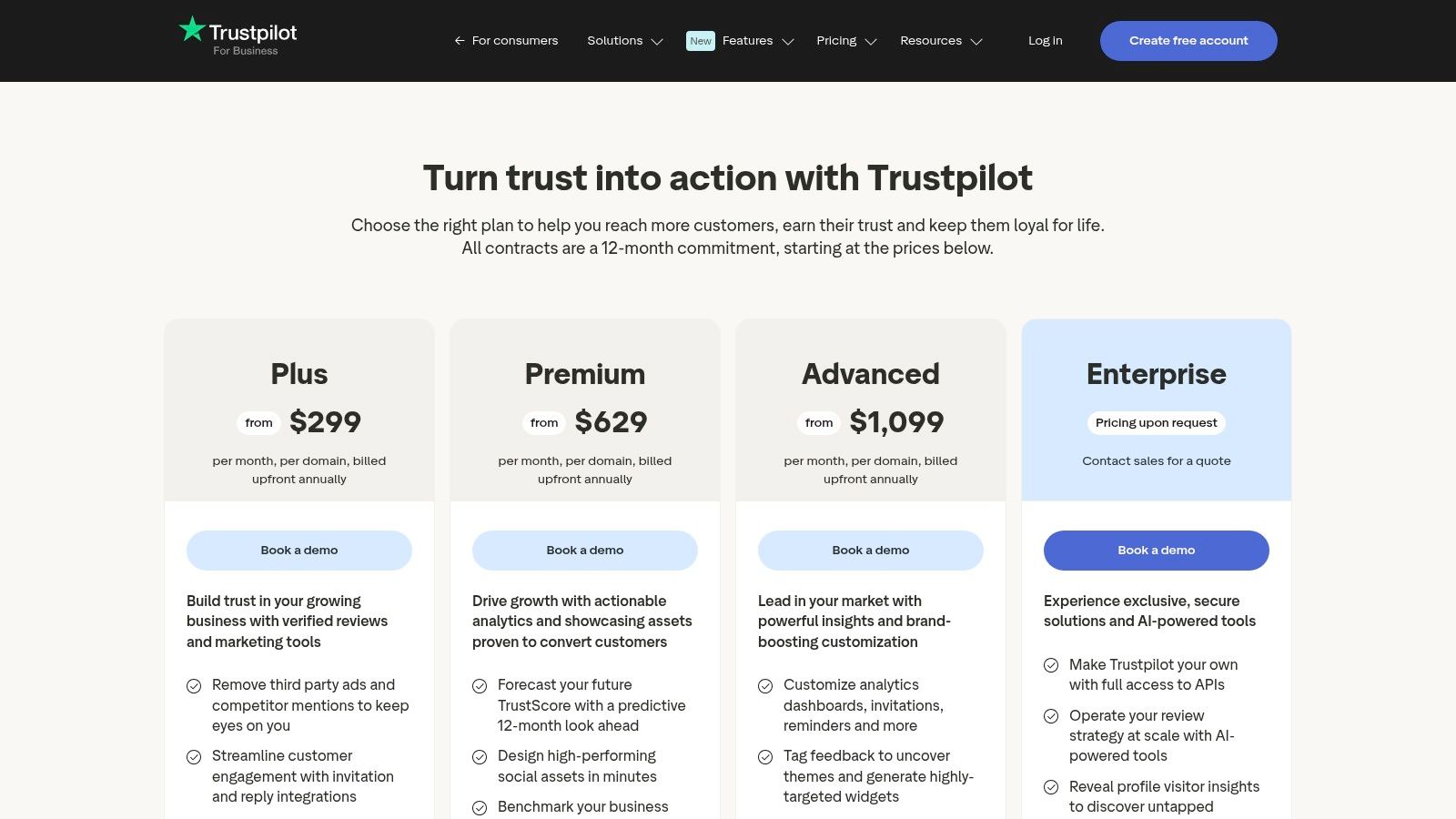
The platform offers a suite of tools for businesses to send automated, verified review invitations, ensuring a steady stream of authentic feedback. Companies can then display this feedback using on-site widgets and marketing assets, directly turning positive reviews into a powerful sales tool. Advanced tiers offer competitor benchmarking and a predictive "TrustScore" that helps businesses understand their performance relative to the market, along with integrations like Salesforce to connect review data with the customer journey. Leveraging this platform effectively can significantly enhance what is social proof in marketing.
Key Features & Considerations
- Automated Review Invitations: Sends customizable, automated emails and reminders to customers to solicit reviews.
- On-site Widgets & Assets: Provides a library of "TrustBox" widgets to display ratings and reviews directly on your website to increase conversions.
- Competitor Benchmarking: Advanced analytics allow you to compare your performance against industry competitors.
- Salesforce Integration: Available on higher-tier plans to connect review feedback with customer relationship management.
Pros & Cons
| Pros | Cons |
|---|---|
| Large, well-established consumer review destination | Requires 12-month contracts and per-domain pricing |
| Excellent marketing tools to enhance conversion and trust | Moderation policies have drawn some user criticism |
| Predictive TrustScore and benchmarking features | Primary focus is on its own platform, not third-party sites |
Trustpilot Business plans start with a limited free option, with paid plans based on features and invitation volume, requiring a 12-month commitment. While it's an exceptional tool for building brand credibility, businesses should be aware that its primary focus is generating reviews for the Trustpilot platform itself, rather than managing feedback across the web.
Website: https://business.trustpilot.com/pricing
11. G2
While not a reputation management tool itself, G2 is an indispensable resource for comparing the best online reputation management tools on the market. It functions as a peer-to-peer software review marketplace, providing up-to-date category pages, vendor comparison grids, and verified user reviews. This makes it a crucial first step for any business building a shortlist of potential platforms. Its primary value is offering a transparent, user-driven perspective on software performance, cutting through vendor marketing claims.
The platform’s real-time grids allow you to filter vendors by features, target market segments (small business vs. enterprise), and integrations, helping you quickly identify solutions that fit your specific needs. Each profile aggregates detailed reviews where users highlight pros, cons, and the specific business problems they solved with the tool. This qualitative data is invaluable for understanding the practical, day-to-day experience of using a particular software, beyond just its advertised capabilities.
Key Features & Considerations
- Real-Time Category Grids: Dynamically ranks software based on user satisfaction and market presence.
- Verified User Reviews: Provides detailed, firsthand accounts of software pros, cons, and use cases.
- Advanced Filtering: Allows users to narrow down options by specific features, company size, and integrations.
- Vendor Comparison: Side-by-side comparisons help evaluate key differences between top contenders.
Pros & Cons
| Pros | Cons |
|---|---|
| Broad vendor coverage across the entire market | Profiles can contain vendor-supplied content |
| User-driven data provides practical insights | Pricing information is often incomplete or missing |
| Excellent for comparing niche or overlapping tools | Requires cross-verification for specific details |
G2 is a free resource for buyers, but it's important to remember that vendor profiles can be influenced by the vendors themselves. Always cross-reference the user reviews and be prepared to contact sales teams directly, as pricing information is frequently not listed. It’s an ideal starting point for research and validation.
Website: https://www.g2.com/categories/online-reputation-management
12. Shopify App Store - Product Reviews
For e-commerce businesses, the Shopify App Store serves as a specialized hub rather than a single tool, offering a curated selection of some of the best online reputation management tools tailored specifically for product reviews. Instead of a one-size-fits-all solution, it provides a marketplace with over 280 apps designed to collect, manage, and display customer feedback directly on storefronts. This approach allows merchants to find a solution that precisely matches their scale, budget, and feature requirements, from simple text reviews to advanced photo and video user-generated content (UGC).
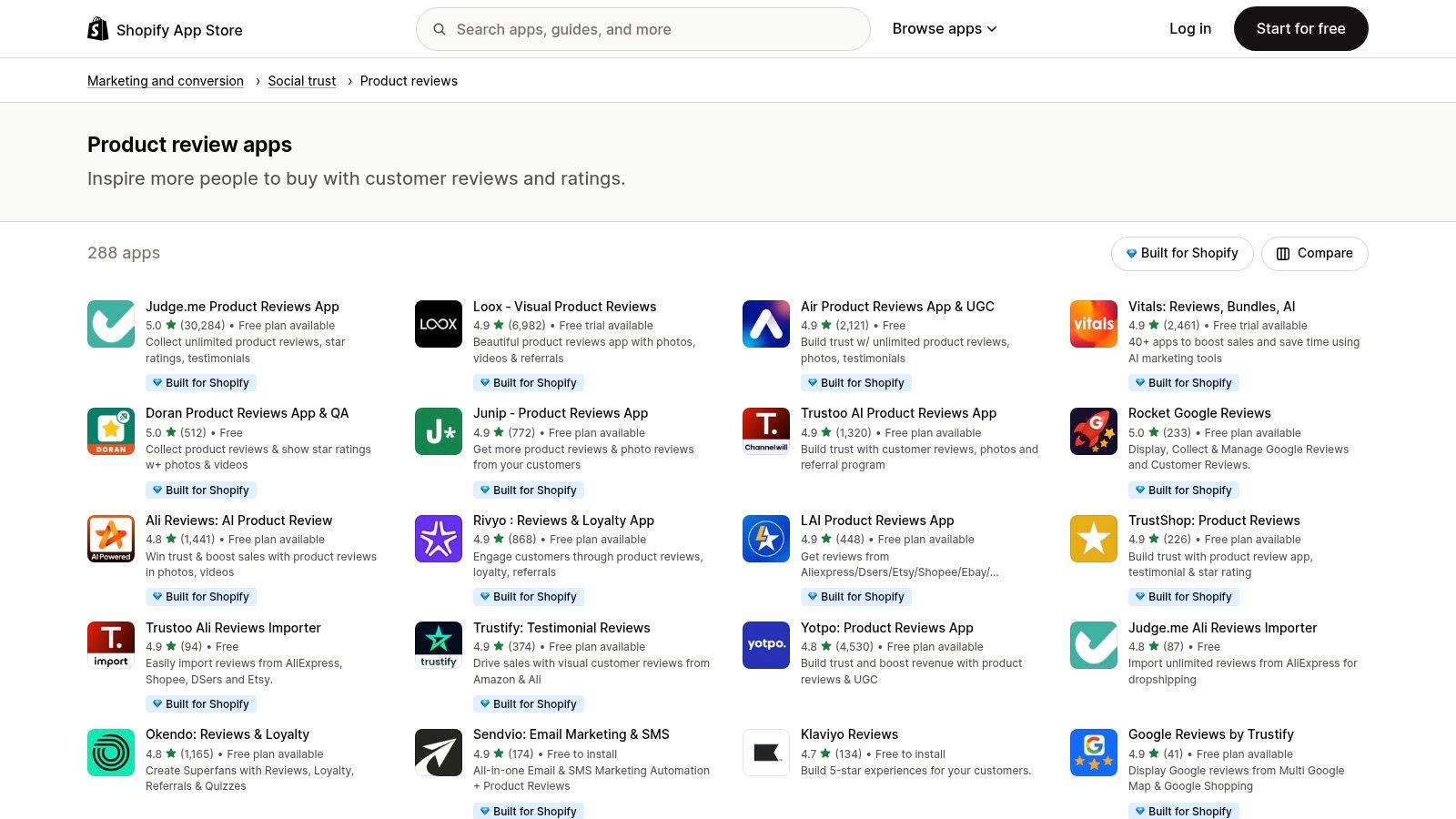
The primary differentiator of using the Shopify App Store is the seamless integration and vast choice. Apps like Loox, Judge.me, and Yotpo can be installed in minutes and immediately begin automating review requests post-purchase. Many of these apps focus on amplifying social proof by making it easy to share positive reviews on social media and feature SEO-friendly widgets with structured data to enhance search engine visibility. This direct impact on product pages makes these tools invaluable for converting new customers.
Key Features & Considerations
- Wide Variety of Apps: Access to a vast marketplace of specialized product review apps with different features and pricing.
- Automated Review Requests: Most apps include systems for automatically sending review request emails or messages after a customer purchase.
- On-Site SEO Widgets: Provides SEO-enhanced widgets that display star ratings and reviews with structured data for rich snippets.
- UGC and Social Proof: Many solutions support collecting and displaying photo and video reviews to build trust and social proof.
Pros & Cons
| Pros | Cons |
|---|---|
| Quick installation and easy to test various apps | Discovery can be overwhelming with hundreds of options |
| Many free or low-cost options for new businesses | Focused almost exclusively on product/store reviews |
| Seamless integration with Shopify ecosystem | Does not offer comprehensive, cross-web ORM |
Pricing is determined by the individual app developer, with many offering free plans, tiered subscriptions based on order volume, or one-time fees. While this ecosystem is perfect for managing on-site reputation, businesses needing to monitor brand mentions and reviews across the wider web will need to pair these apps with a more comprehensive ORM platform.
Website: https://apps.shopify.com/categories/marketing-and-conversion-social-trust-product-reviews
Top 12 Online Reputation Management Tools Comparison
| Platform | Core Features/Characteristics | User Experience & Quality ★ | Value Proposition 💰 | Target Audience 👥 | Unique Selling Points ✨ |
|---|---|---|---|---|---|
| MakerBox 🏆 | AI-driven bios, photos, content for LinkedIn, X, Reddit, Mastodon; content library & scheduling | 4.8★ High engagement (3.5×), 87% more connections | $19.99 Lifetime Deal; user-controlled AI costs | Professionals, agencies, freelancers | AI portrait magic (10+ art styles); multi-client & white-label options |
| Birdeye | Review generation/response, listings, messaging, ads amplification | 4.2★ Broad review site coverage | Custom pricing, enterprise focus | Multi-location brands | AI-powered review agents; SEO & marketing integrations |
| Podium | SMS-based review workflows; unified messaging inbox | 4.0★ Strong SMS review collection | Variable pricing, industry-specific plans | Local businesses & franchises | Centralized messaging (SMS, web chat, social DMs) |
| Reputation | RXM platform: reviews, surveys, social, listings, analytics | 4.1★ Extensive modules & analytics | Enterprise pricing, sales negotiation | Large enterprises, regulated industries | AI-assisted bulk responses; proprietary Reputation Score |
| Yext Reviews | Review & listings management integrated with local SEO | 4.0★ Strong listings & reputation linkage | Custom pricing, location-dependent | Multi-location brands | Seamless integration with Yext listings, pages, search |
| ReviewTrackers (by InMoment) | Central inbox, review automation, listings, rank tracking | 3.9★ Focused review ops | Location-based pricing packages | Local businesses & SMBs | Optional employer/app-store reviews; white-label |
| Sprout Social | Social media & review management, publishing, analytics | 4.3★ User-friendly, strong analytics | Per-user pricing, better with annual plan | Teams & enterprises | Unified Smart Inbox; social listening & scheduling |
| Brand24 | Real-time social/web listening & sentiment tracking | 4.1★ Transparent pricing, fast alerts | Tiered plans, free trial available | SMBs to enterprises | Unlimited users on higher tiers; AI sentiment summaries |
| Mention | Media monitoring & social listening; sentiment & competitor analysis | 4.0★ Broad source coverage | Premium-priced starting at $599/mo | Enterprises | Advanced Boolean queries; team collaboration |
| Trustpilot Business | Consumer reviews platform; analytics & marketing assets | 4.2★ Large, reputable consumer reviews | 12-month contracts; per-domain pricing | Businesses needing verified reviews | Marketing widgets; predictive TrustScore |
| G2 | Software review marketplace with user reviews & pricing | 4.3★ Fresh user-driven data | Free to access; vendor pricing often hidden | Buyers researching ORM software | Detailed vendor grids; filters by features & segments |
| Shopify App Store - Reviews | Marketplace with 280+ review apps for Shopify stores | 4.0★ Many free/low-cost apps | Individual app pricing, trials | E-commerce SMBs | SEO-friendly widgets; UGC content support |
Making Your Final Choice: How to Select the Right Tool for You
Navigating the landscape of the best online reputation management tools can feel overwhelming. We've explored a wide spectrum of platforms, from comprehensive enterprise suites like Reputation and Birdeye to specialized B2B review aggregators like G2, and even niche solutions for e-commerce like the Shopify App Store. The key takeaway is simple: there is no single 'best' tool. The right choice is entirely dependent on your unique context, goals, and resources.
This guide was designed not to crown a winner, but to serve as a detailed map. By understanding the specific strengths of each platform, from Podium's SMS-centric approach for local businesses to Sprout Social's integrated social media command center, you are now equipped to make an informed decision that aligns perfectly with your strategic objectives.
Recapping the Core Tool Categories
To simplify your final decision, let's distill our findings into the primary categories of tools we've discussed:
- All-in-One Platforms: Solutions like Birdeye, Podium, and Reputation are built for businesses, especially those with physical locations, that need to manage reviews, listings, customer communication, and analytics from a single dashboard. They are powerful but often come with a significant investment.
- Social Listening & Monitoring Tools: Platforms such as Brand24, Mention, and the listening features within Sprout Social excel at tracking brand mentions across the web. They are essential for proactive reputation management, sentiment analysis, and identifying emerging trends or potential crises.
- Review-Specific Platforms: Tools like ReviewTrackers, Yext Reviews, and B2B-focused sites like Trustpilot and G2 specialize in aggregating, managing, and generating customer reviews. They are critical for building social proof and improving local SEO.
- Personal Branding & AI-Powered Tools: A newer, but rapidly growing category, features innovative solutions like MakerBox. These are designed for individuals, freelancers, and entrepreneurs who need to build and manage their personal brand's authority and visibility online, often leveraging AI to automate and scale their efforts.
A Practical Framework for Your Decision
Before you sign a contract or start a free trial, walk through this strategic checklist. Answering these questions will illuminate the path to the right tool.
- Define Your Primary Goal: What is the single most important problem you need to solve? Is it generating more positive reviews on Google? Monitoring for negative brand mentions on Twitter? Building your personal authority as a thought leader? Be specific. A local plumber's needs are vastly different from a SaaS founder's.
- Assess Your Business Scale & Type: Are you a solo consultant, a small e-commerce store, a multi-location franchise, or a large enterprise? The scale of your operations will dictate whether you need an enterprise-grade solution like Reputation or a more focused, individual-centric tool.
- Evaluate Your Resources (Time & Budget): Be realistic about your budget and, just as importantly, the time you can dedicate to using the software. A powerful tool is useless if your team doesn't have the bandwidth to implement and manage it effectively. Some platforms require more hands-on effort than others.
- Consider Your Technical Ecosystem: How will this new tool integrate with your existing systems, like your CRM, marketing automation platform, or e-commerce backend? Seamless integration can save hundreds of hours and prevent data silos.
Choosing from the best online reputation management tools is a strategic investment in your brand's future. It's about taking control of your narrative rather than letting it be defined by others. Whether you're a startup founder meticulously building a brand from scratch or an established company protecting a legacy, the right platform will empower you to listen, engage, and grow. Use the insights from this article to move forward with confidence, select a tool that feels like a true partner, and start building a reputation that not only shines but also drives tangible results.
Ready to move beyond just monitoring and start actively building a powerful personal brand? Many of the best online reputation management tools are for companies, but MakerBox is designed specifically for individuals. It provides the AI-powered tools and community support entrepreneurs and creators need to build authority and grow their online presence. Explore MakerBox to see how you can take control of your personal reputation today.




